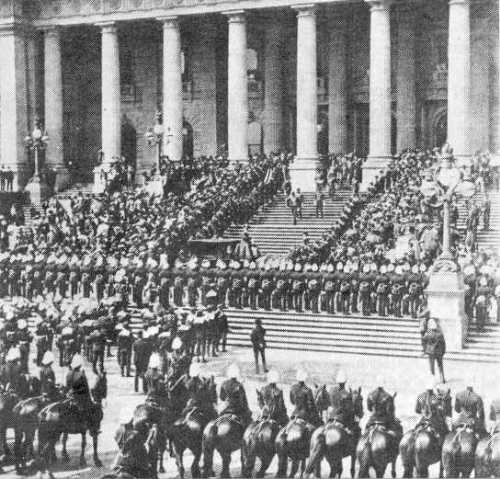"When a number of people are assembled together, and someone proproses a certain collective action to be taken by all as a body, that implies that either all those present must be or become unanimous, or else that one party, say the majority, must govern; there being no other course except for all who are not of one particular opinion to secede altogether, although there may be other matters for which they would like to remain.
This way of doing things is entirely wrong. Instead of proposing that some collectivisation in a particular direction be taken by a number of people who are only assembled to listen and formulate opinions or in pursuit of some quite independent purpose, what should be done is to put forward the idea and invite those who agree with it to join and carry it out. By doing this it is neither necessary that all those present should be unanimous, nor that the majority - or any other section - should rule, nor yet that on account of differing upon this purpose people should break up the combination in which they are united for a purpose which they are agreed upon.
In the event of a difference of opinion inevitably arising among people who are associated together for one distinct purpose - owing to new circumstances arising or new ideas being formed, it is absurd to have a plan such as majority rule agreed to in advance, because nobody can tell till the occasion presents itself what will be his own best way out of the difficulty.
Small differences will become smoothed over in discussion. Sometimes the individuals who find themselves in the minority may think it best to go with the majority. I may believe that the right hand is best, but still be ready to go with you to the left rather than go alone or rather than leave you to go alone. But this can also happen if I stand for the majority and you for the minority, especially as it often happens that the majority have only a slight preference - do not care very much which way they go; whilst they can see that the minority are very deeply in earnest about their way of thinking. If the difficulty is not overcome in this way, it may be possible that some third plan will suggest itself, which all parties would rather accept than separate. Or the different parties may agree to help. Or again those of each party may go their own way on whatever scale is possible to them by themselves.
The result of these ideas being applied would be the abolition of government, since instead of some people deciding what others shall or shall not do, everyone would be deciding what he himself will or will not do. Thus everyone would have a life of his own to lead, instead of being required to follow that ordered for him by somebody else. He would cut his life to fit himself, and not be called upon to cut himself to fit a shop-made life ordained for him to wear as a uniform.
We anarchists believe that the foregoing is the only just and rational plan of society. We believe also that all so-called rights which mean that the possessor of them is constituted a holder of authority over other people to dictate to them that they shall or shall not do, or use, or have the benefit of something, and that it is their duty to obey because he so wills, are not rights, but are lies, are wrongs; that the only reason why people should be associated together is to increase the amount of satisfaction possible to each individual, and that therefore the only reasonable way of judging one's own or anyone else's conduct is to consider what needs he has felt, and whether in trying to satisfy them, he has been as considerate of the needs felt by other people as the circumstances of the case warrant those who are allied with him to expect, on the understanding that each will do his best to make possible the fullest satisfaction of other people's needs, besides his own.
This understanding is the only one upon which society can exist without castes, classes, privileges, and subordinations; and the first need of everyone is freedom to be himself, to respond in his own way to the impressions made on him from within and without.
